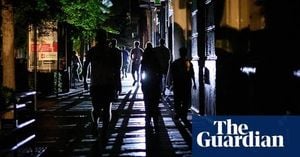The start of the year 2025 came with quite the commotion at Arpoador Beach, Rio de Janeiro, where what has been dubbed the "Surubão do Arpoador" took place—a public orgy involving dozens of men. This infamous event kicked off during the New Year’s Eve celebrations and continued until early morning on January 1.
According to reports from O Globo, the 14th Police Department (DP) of Leblon initiated an investigation on January 3 to determine the identities of the participants involved, who were recorded engaging in sexual activities. Videos of the incident quickly circulated on social media, garnering widespread attention and raising serious legal questions.
The incident drew immediate scrutiny under Brazil's Article 233 of the Penal Code, which defines the public display of sexual acts as a crime punishable by three months to one year of detention, or fines. The act was particularly provocative due to its timing; typically, these encounters occur at night, but this occasion extended beyond dawn, attracting early morning patrons who stumbled upon the spectacle.
Arpoador has long been identified as a casual encounter spot within the LGBTQIA+ community, often serving as a rendezvous point for spontaneous sexual activities. The skatepark area, where the orgy took place, is perpetually listed among the best locations for outdoor sexual encounters, as emphasized by various local guides. Despite its notorious reputation, it had not previously drawn such intense public and media scrutiny, particularly following this January 1 incident.
"After the circulation of videos on social media, the 14th DP (Leblon) has opened procedural investigations to clarify what happened," said the police via a public statement. Investigators are currently conducting efforts to piece together the identities of the men captured on tape.
The gravity of the situation has led to notable consequences, even triggering familial discord for some involved. One netizen recounted discovering their relative prominently featured in the viral clips, claiming, "Help! My uncle was caught on video at Pedra do Arpoador during the Surubão with a whole bunch of men. My aunt already packed his stuff and put everything in a bag; the family is in chaos!"
Such gatherings, though illegal, are not isolated to Rio de Janeiro. Similar situations have been reported across various cities, including São Paulo, where parks and public spaces like the Ibirapuera Park, Ecológico do Tietê, and the Marginal Pinheiros bike path attract crowds seeking casual sexual encounters, often leading to complaints from local residents.
This occurrence refocused attention on the delicate balance between public freedoms and legal boundaries, especially within LGBTQIA+ spaces. While the region has seen many successful and vibrant gatherings, incidents like the Surubão illuminate the often-unacknowledged risks involved.
Moving forward, will this alter the dynamics or expectations surrounding public spaces renowned for their more liberated social atmospheres? How will police enforcement adapt to maintain order without infringing on individuals’ rights to congregate and express themselves freely? Observers will undoubtedly keep close tabs on how this investigation evolves.
The aftermath of the Surubão at Arpoador hasn’t just stirred discussions about legality but reignited dialogues about acceptance, judgment, and the social fabric governing public behavior. The collective memory of this event may forever frame it as one of the most talked-about and contentious public gatherings seen at the start of the New Year—prompting both laughter and serious contemplation about societal norms.
With the authorities intent on identifying those who participated, and the public watching closely, the Surubão do Arpoador stands not only as a reflection of personal choices and consequences but also as a symbol of the challenges facing modern urban life at its most unabashedly candid.



